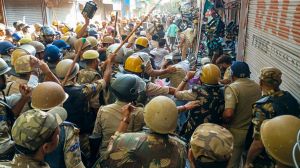J-K expands rehabilitation body’s role
The Jammu and Kashmir government today expanded the role of the Rehabilitation Council to cover victims of violence. The Council was origina...

The Jammu and Kashmir government today expanded the role of the Rehabilitation Council to cover victims of violence. The Council was originally instituted to help victims of militant fire.
The Council — set up on February 14, 1996 by the State Government — can now help families of slain militants as well as those killed by security forces. In fact, the idea behind setting up the body had been to alleviate the suffering of victims of violence especially the widows and orphans, whose numbers had risen sharply in the past 12 years. But when the brief of the Council was tampered with and its role limited to victims of militant fire who had filed FIRs, the effort had failed to achieve any result.
Today, Chief Minister Mufti Mohammad Sayeed also ordered streamlining the Council’s functioning, reconstituting its governing body. The new body will have 21-members led by the CM with the Social Welfare Minister as its vice-president. In a welcome departure, social workers and representatives of major voluntary organisations will be involved.
Barring PDP president Mehbooba Mufti, the other non-government members include Dr G.Q. Allaqaband, Bashir Ahmad Alamgir of Hussaini Relief Committee, Nighat Shafi of HELP Foundation, J.N. Koul of SoS Children’s Village, Fozia Bukhari, S.N. Dhar, K.L. Dubey of SoS Home Channi Rama Jammu, A.R. Hanjoora of J-K Yateem Trust, A.R. Hanjoora, Maj Gen J.S. Jamwal, Qazi Mohammad Amin and Ved Bhasin. The Government will be represented by Secretary, Union Ministry of Social Justice and Empowerment and J-K Chief Secretary, Financial Commissioner, J-K Home Department, Financial Commissioner, J-K Finance Department, Principal Secretary, J-K Planning and Development Department, Principal Secretary, Social Welfare Dept and Executive Director, J-K Rehabilitation Council.
After the meeting, Mufti emphasised on the need to provide succour to the victims. ‘‘We have decided to expand the role of the Council and now every victim of violence will benefit from it,’’ Mufti said. ‘‘I have also asked them to hold meetings at regular intervals to push forward this massive welfare work. We plan to turn the work of this Council into a peoples’ movement.’’
Apart from the governing body headed by the CM which provides overall policy direction, the executive body, led by the Chief Secretary, is responsible for executing policy decisions. The other component, district committees under district development commissioners, will take up implementation and disbursal of money for schemes.
The first challenge, however, is the survey to identify victims of violence in the state, which was the Council’s first assignment when formed in 1996. The survey was never held and as a result, the Council could not know areas that were worst hit — the criteria for granting funds.





- 01
- 02
- 03
- 04
- 05


























